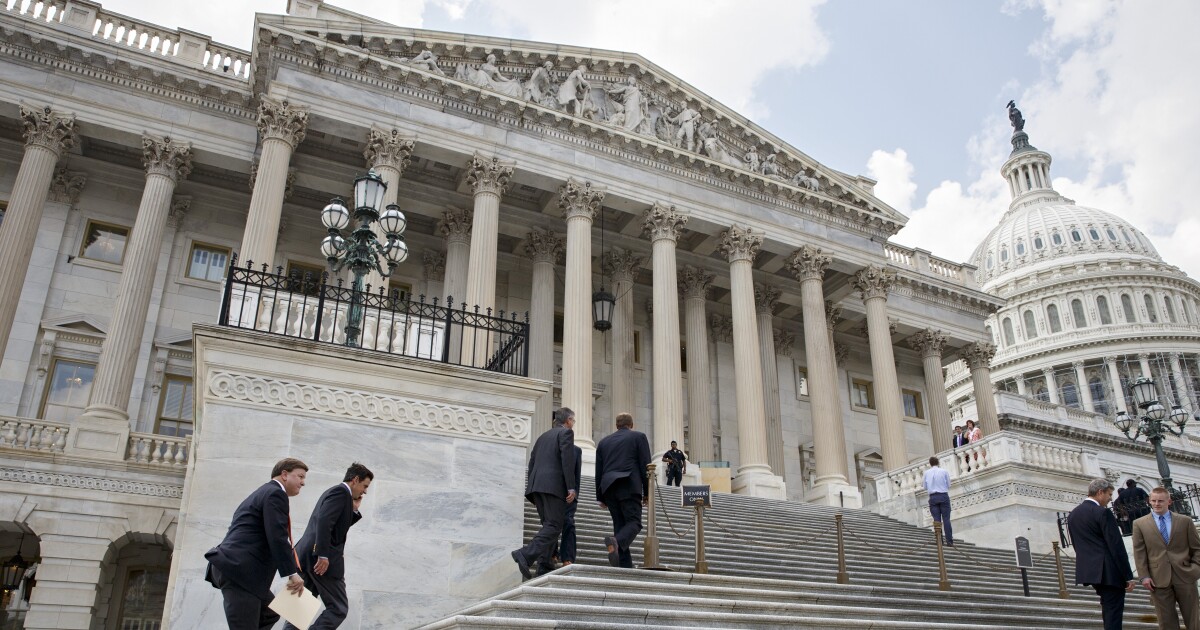

Provisions passed by House Republicans to undo Biden administration climate regulations while imposing deep cuts to agencies will be up for negotiation as lawmakers return to Washington and focus on funding the government.
Some of these riders, which are attached to appropriation bills that must be passed to avoid a government shutdown, would withdraw funding for Democrats’ signature climate bill passed last year and undo several environmental regulations set by the executive branch. However, many of the provisions cross a red line for Senate appropriators on both sides of the aisle, possibly dooming them.
SINEMA’S ROLE AS BIPARTISAN DEAL-MAKER TESTED IN BORDER TALKS: ‘SHE IS AT THE EPICENTER’
“If you’re trying to enact a law, these are all nonstarters,” said Sen. Brian Schatz (D-HI), who sits on the Senate Appropriations Committee. “This is a way for people to kind of express themselves, but this is not a key aspect of whether or not we get an approps deal.”
Several policy riders would repeal the Biden administration’s rulemaking, including by undoing the Environmental Protection Agency’s revised “Waters of the United States” definition, revoking protections for certain organisms under the Endangered Species Act, and prohibiting the EPA from enacting rules regulating greenhouse gas emissions. Another rider would ban funding for the administration’s recently launched Climate Corps.
Other amendments would halt the Biden administration’s efforts to tighten efficiency standards regulating appliances, including commercial ice makers, gas furnaces, and air conditioners.
Schatz was one of 41 Democratic senators who called on top appropriators in November to keep the environmental riders out of any final spending deal, asserting the provisions do not affect federal spending and are an attempt from Republican lawmakers to bypass congressional debate and advance them in must-pass legislation.
“House Republicans have loaded up their partisan spending bills with anti-environment poison pills to please their fossil fuel donors,” Sen. Sheldon Whitehouse (D-RI), who led the group, said in a written statement. “These giveaways to Big Oil have no business in any bipartisan spending deal.”
But they’re not alone. Republicans on the committee are also holding firm on not including the riders in any final agreement.
“We’re working on making sure that there are no poison pills,” said Sen. Lisa Murkowski (R-AK), the top Republican in charge of the Interior-Environment Appropriations Subcommittee. “That was kind of the agreement on the Senate side. That’s what allowed our bills to be able to advance on a bipartisan basis.”
Still, many of these riders could be brought to the floor as stand-alone amendments if they are considered germane to the bill, but they are unlikely to garner the 60 votes needed to pass under a Democratic majority.
Another crucial detail that remains in question is whether there will be significant cuts to agencies and departments in any finalized spending deal. Lawmakers left for the holiday without an agreement on top lines, which are essential for moving budget talks forward. Top lines determine funding levels for nondefense and defense spending, along with allocations for the 12 different appropriation bills.
Appropriators said it would be difficult to hammer out differences if top lines are distant from the levels the House and Senate are working with.
“If they’re too far off, what I don’t understand is, how do you conference a bill that’s miles apart, not blocks apart?” said Rep. Chellie Pingree (D-ME), the ranking member of the House Appropriations Subcommittee on Interior, Environment, and Related Agencies. “I just feel like we’re all keeping our blinders on.”
Top lines had already been far apart between both chambers, with House Republican appropriators writing bills that were below the levels established in the debt limit deal negotiated between the White House and previous House GOP leadership. In October, the lower chamber passed the energy and water appropriations bill, which provides funding that is $4.9 billion below the negotiated levels. The bill made spending cuts targeting several areas of the Biden administration’s regulatory regime, including a 42% cut to the Energy Department’s Energy Efficiency and Renewable Energy Office. The measure would also repeal $5.7 billion in funding for Inflation Reduction Act programs and revoke $15 billion in loan authority for the DOE.
Other appropriation bills would impose similar steep cuts. The House’s version of the Interior and Environment appropriations bill, which was passed in November, would enact a 39% cut to the EPA, a level many Democrats have decried as untenable.
“That’s completely unacceptable,” Pingree said. “We couldn’t even operate at that level … and just staffing the agency, it wouldn’t happen.”
The Interior bill rolls back $9.4 billion from the Inflation Reduction Act — a big chunk of which is dedicated to the EPA’s Greenhouse Gas Reduction Fund, along with more than a billion dollars meant to aid poor communities hit hard by pollution.
The White House has already threatened to veto both bills, citing the funding levels and riders.
House Speaker Mike Johnson (R-LA) is pushing for spending to be close to or at the $1.59 trillion level agreed upon in the debt limit deal, a move that had angered the right flank of the Republican conference. However, members of the Freedom Caucus softened their stance in late November, asserting they would accept the levels established in the budget deal so long as there were no “side deals” attached or further nondefense spending using budgetary gimmicks.
Once lawmakers gavel back into session, they will have little time to negotiate the finer details of any agreement by the appropriate deadlines: Jan. 19, which is the deadline for four appropriation measures, including the Energy and Water bill; and Feb. 2, the cutoff date for the remaining eight bills. And it’s not as if legislators don’t have other priorities on their plates — leadership is still negotiating an aid package to Ukraine that would include major reforms to immigration policy.
Senate Appropriations Committee ranking member Susan Collins (R-ME) told the Washington Examiner before lawmakers adjourned that it is unlikely another stand-alone appropriations bill will be brought to the floor for a vote.
“[It’s] extremely frustrating since we reported all the bills by the end of July with overwhelming bipartisan support,” Collins said.
That leaves many worried that the clock has run out on passing individual spending bills and that appropriators are left with three options: passing a yearlong continuing resolution into the fiscal year, negotiating an overarching spending bill that’s known as an omnibus, or facing a government shutdown.
Some House Republican appropriators expressed disappointment that lawmakers will be facing a crunch once they return in January, noting the amount of legwork it takes for bills to be passed through regular order.
“[It’s] frustrating for us because I don’t think a lot of people understand how long it takes to negotiate one of these bills out and how to write it and stuff,” said Rep. Mike Simpson (R-ID), chairman of the interior and environment appropriations subcommittee. Still, he noted, Republican appropriators won’t necessarily be starting from scratch. They will have the bills they passed out of committee to reference during negotiations.
“Obviously, we fight for our bill, understanding that not everything we put in our bill is going to be in the final bill,” Simpson added. “Same thing with the Senate. And that’s how the negotiations go. We give up some stuff, they give up some stuff … and that’s how it’ll all work out.”
CLICK HERE TO READ MORE FROM THE WASHINGTON EXAMINER
Other Republicans were more optimistic about coming out triumphant ahead of the government deadlines.
“I’m optimistic that we’re going to get a top-line number, that we’ll get an allocation, and that we’ll have sufficient time to address the bills for [Jan.] 19, one of which is mine, and then others for [Feb.] 2,” said Rep. Chuck Fleischmann (R-TN), chairman of the energy and water development appropriations subcommittee.






